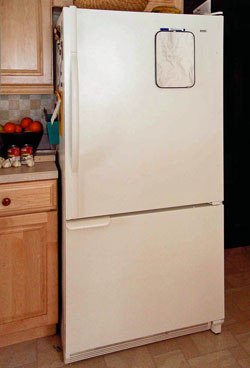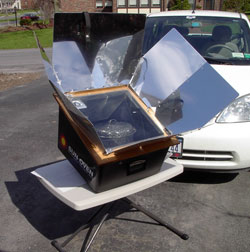Our appliances
Appliances use a lot of energy in a household, but we're trying to reduce this source of energy use.
One handy way to find out which appliances use the most energy is a Kill-a-Watt meter.
Keeping food cold
 ©Janet Allen
©Janet AllenWe've bought Energy Star appliances, like this refrigerator, whenever we could.
Another aspect of appliances, though, is the size of the appliance itself. Some refrigerators, for example, sold today are huge—surely more than is truly necessary.
Fortunately, the regulations put in place about ten years ago or so improved the efficiency of refrigerators. It's too bad there hasn't been similar economy-wide incentives for energy efficiency in other areas since then.
Cooking food
 ©Janet Allen
©Janet Allen Our solar oven
Our regular oven is electric. Electric is convenient, but we would probably get a gas range the next time. There really is no way for an electric appliance whose only function is to produce heat to do that job efficiently.
We bought this solar oven on eBay a few years ago, but haven't gotten in the habit of using or even learning how to use it effectively. I did make cookies once, but I think the best use would be to perhaps put a pot of beans in there in the morning and just let it cook all day. Although the idea of cooking with solar is intriguing, in the end we decided that our son in sunny North Carolina would be better able to use this.
 ©Janet Allen
©Janet Allen Steaming beets in a pressure cooker
This modern free-standing electric pressure cooker is safe, and it cooks food quickly. And taking less time to cook means using less energy. (Another benefit is that the food retains more nutrients.)
Energy-saving cooking strategies
Just as we group errands when we use the car, when we heat the oven, we try to use it to bake more than one thing (usually consecutively since the temperatures are different, and we don't want the flavors to mix.)
We cook with the lids on pots. Much less energy is used to accomplish the same thing.
Our habit of tripling or quadrupling recipes saves energy as well as time. I'd hate to heat the oven to back one loaf of bread, for example, when the same heat could bake four loaves.
Phantom energy
Almost every household wastes a lot of energy just keeping things plugged in. Anything, such as a TV, that is "instant-on" gets that way by continually feeding it energy, even when it's obstensibly OFF! We've made half-hearted attempts to deal with this problem, but so far the only place we've been successful is with the TV / DVD player equipment, and that's only because we so rarely use them. We plug all that stuff into a power strip and just turn the power strip on when we're going to use the TV, then (hopefully) turn it off when we're done.
I'm sure there are other places in the house where we could use powerstrips in this way, but we haven't put much effort into this yet, unfortunately.
